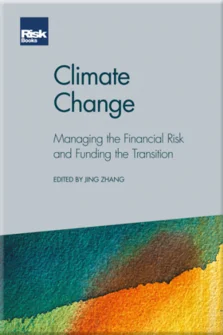Mobilising private funding
Christopher A McHugh
Mobilising private funding
Foreword
Introduction
Sustainability for critical ecosystems: The future of risk management – more of the same or a new paradigm?
Climate change is a source of financial risk
The climate disclosure landscape in the finance sector
Green boxes? An overview of climate risk tools and analytics
Embedding climate change in financial metrics
Modelling climate physical risks
Climate-related stress-testing: Transition risks
Catastrophe risk modelling and climate change
Evidence-based climate stress testing
Climate risk drives a new paradigm in risk management
Incorporating climate change in asset allocation and portfolio construction
(Car)bon voyage: The road to low-carbon investment portfolios
Climate risk primer for community banks: Concepts and policies during a period of significant change
Next-generation analytics for climate finance
Climate finance post-COP26
Mobilising private funding
Finding better ways to finance the climate transition has become a matter of urgency. The publication of the 6th IPCC Assessment Report in August 2021, during a summer of wildfires and floods around the world, foreshadowed what might happen if the planet warms beyond the Paris Agreement targets agreed at COP21 in 2015.
The Paris Agreement was not the only event of note in 2015. That year also marked the launch of the United Nations Sustainable Development Goals (SDGs) and a concerted push by multilateral development banks (MDBs) to mobilise the private sector in support of these targets. The confluence of these events, and the increased awareness of the urgency of focusing on our climate, has precipitated the start of a radical transformation of the financial services industry which has a long way to run.
A key starting point in assessing mobilisation efforts is to recognise that the climate transition problem is systemic, and that resolving it will require coordination between governments, corporations, the financial sector and consumers. The definition of “mobilisation” for this chapter is the influence that public sector development institutions seek to have on private
Copyright Infopro Digital Limited. All rights reserved.
As outlined in our terms and conditions, https://www.infopro-digital.com/terms-and-conditions/subscriptions/ (point 2.4), printing is limited to a single copy.
If you would like to purchase additional rights please email info@risk.net
Copyright Infopro Digital Limited. All rights reserved.
You may share this content using our article tools. As outlined in our terms and conditions, https://www.infopro-digital.com/terms-and-conditions/subscriptions/ (clause 2.4), an Authorised User may only make one copy of the materials for their own personal use. You must also comply with the restrictions in clause 2.5.
If you would like to purchase additional rights please email info@risk.net











